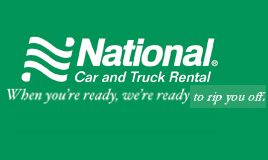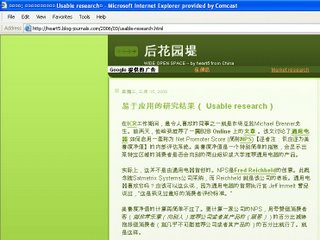People are going to think I'm the new step-child of
Fred Reichheld, creator of the loyalty concept called Net Promoter Score (
NPS), a simple index that subtracts those who aren't strongly likely to recommend a company from those who are.
Reichheld is pitching another concept in a new book. It's the notion of "bad" profits. How can a firm call any profit "bad", you might ask? Well, bad profits are earned at the expense of customer relationships -- when a company makes the customer, member, or client feel like they've been misled, mistreated, coerced, or abused. Bad profits are the bank's $35 overdraft charge on a check for $9.75. Bad profits are (were)
Blockbuster's late fees on video rentals. Bad profits are when your $89 hotel room bill also comes with a $12.50 surcharge for using the telephone, even to call 1-800 numbers.
Bad profits are especially harmful to a corporation because, while they may momentarily please Wall Street shareholders, bad profits actually undermine the foundation of customer loyalty (or
"preference formation", as
ICR's Dr. Steve Ballou likes to say). And typically, only firms with strongly loyal customers can capitalize on the long-term profitability benefits of word-of-mouth referrals and implementation of premium services. Companies that regularly exercise their right to earn bad profits are unknowingly creating a customer base that is so ready to defect, that when they do switch brands, they take 3 or 4 other customers (their family, friends, and co-workers) with them.
Very recently, I had one such experience on the receiving end of bad profits. We took our annual vacation to
Key West, Florida. We love the drive down the
Overseas Highway, so our airline flight was into and out of Fort Lauderdale.
When I chose a rental car, I knew our family would want a nice minivan, to carry our luggage and little Maddie's innumerable supplies, as well as have the opportunity to shuttle my wife Stephanie's sister and two cousins, who were also going to be in Key West that week. I used
Orbitz to shop for and reserve a rental minivan.
Orbitz does a nice job of displaying all of the comparable rental rates from various car rental firms. In my mind, over the years I have built the following price/value images of the available car rental firms, when it comes to minivans:
Hertz is almost always the most expensive option, and I don't see the value benefit of their services, which seem to cater to executives in a hurry.
Avis does "try harder", but this apparently means that they have found a price-point that lies just below Hertz's, but above everyone else's.
Then, we have the free-for-all among the remaining car rental agencies:
Alamo,
Budget,
Dollar,
Enterprise,
National, and
Thrifty. They are typically competitive with each other on price, service, and airport facilities.
You also can find a lower tier of local or regional rental companies, like Advantage, E-Z, Fox, and L&M. They are almost always just a bit cheaper than the free-for-all companies, but you usually compromise on the location of their car lots and/or the extensiveness of their roadside service.
Anyway, for this particular trip, we chose National Car Rental -- it was a brand that I trusted, and they were offering an American-made minivan for only $239 for an 8-day rental. My contract was for Friday evening through the following Saturday afternoon. I didn't read or notice the fine print that said, "Rates are subject to change if vehicle is not returned on the date and time agreed upon at time of reservation and rental."
On February 11th, the Philadelphia area was due for a major snowstorm in the evening, and on that morning, we were still in Key West. Fortunately, I had called our airline (
Southwest) the night before, and we got our evening flight seats changed to an 11:00 AM flight. (Believe me, my wife and daughter were not pleased to depart Key West for the drive to Fort Lauderdale at 5:30 in the morning! But, in the end, it was the right decision -- we got 15 inches of snow in my neighborhood.)
In the rush to drop off our minivan at the National return area at the FLL airport, it never occurred to me that there would be any inconvenience on National's part, to take back our vehicle at 9:45 AM, rather than at 5:00 PM as contracted. Well, apparently this was a major hassle for National, because they took the liberty of charging not $239 for my rental, but an amazing $515! I didn't even notice this on the heat-transfer receipt that the check-in agent in the garage gave me. Indeed, I wouldn't have even noticed it a couple of weeks later, had I not carefully looked at our credit card statement for the month.
How dare a company MORE THAN DOUBLE an already substantial bill, just because a customer did not use a product or service for an additional "expected" seven hours? When I called National to complain, they were indeed quick to refund the overcharge, and they weakly explained that "their computer system" recalculates rates based on the most expensive daily rate if a return time is not within an hour of expectation. I wondered aloud to them, "How many of your loyal customers simply don't notice this overchage, and furthermore, how angry do those observant ones become?"
The representative I spoke to sheepishly said that this is something that agents have been complaining to management about for some time. It's just not fair to the customer. It's not abiding by the Golden Rule -- treating others the way you would want to be treated. Do you think if customers of National Car Rental found a way to fleece the company for over $300 just by manipulating the clock a little, the firm would stand by idly without changing the system? Of course not!

So now, here I write. And about 15 people per day will read this article. And they, like me, will now place National Car Rental (and perhaps even its sister company, Alamo) at the
bottom of that "free-for-all" class of car rental agencies. I'm not saying I would
never use National's services again, but I am saying that I will not forget this experience when I'm choosing my next rental car.
Tags:
Alamo,
Avis,
bad profits,
Ballou,
Blockbuster,
Budget,
Dollar,
Enterprise,
Fred Reichheld,
Hertz,
Key West,
National,
National Car Rental,
Orbitz,
Overseas Highway,
Net Promoter Score,
Reichheld,
Steve Ballou,
Thrifty,
Southwest







